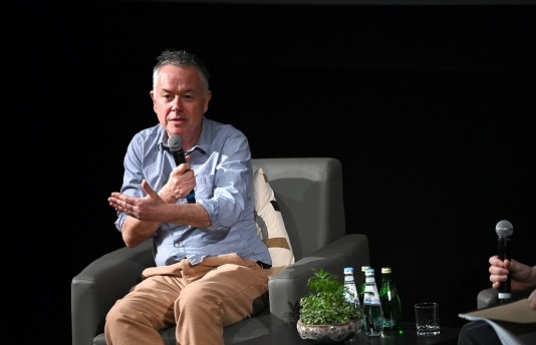Understand why and how people behave, and research the theme extensively, says Qumra Master Michael Winterbottom
Mar 15, 2023

Doha, Qatar; March 15, 2023: Qumra Master Michael Winterbottom, the critically acclaimed British filmmaker renowned for unconventional narratives and hard-hitting social commentary, said extensive research and meeting people to understand why and how they behave in various situations is at the heart of his approach to filmmaking.
Highlighting his interest in themes that have universal resonance, Winterbottom commenced his masterclass at Qumra, the annual industry talent incubator event by the Doha Film Institute, by sharing the experience of co-directing Eleven Days in May (2022). The film documents the memories shared by the families of over 60 Palestinian children killed by an Israeli bombing of Gaza over 11 days.
Giving full credit to his co-director, Gaza-based Mohammed Sawwaf, Winterbottom says “it is more his film than mine. It is almost a memorial for those children, their thoughts, their dreams. We wanted some memory of these children to be not forgotten.”
The searingly intense film follows a repetitive pattern, where families share eloquent memories, some breaking down while talking, and others unable to control their emotions.
“These are not just sad stories,” says Winterbottom, on why he chose the film’s repetitive structure. “By the end of the film, there is a cumulative impact, knowing about the many hopes and dreams that were destroyed. And this is not one isolated event that happened in Gaza. It repeats itself through history. It has happened before and may happen again, showing the repetitive nature of tragedies created by humans.”
A bold filmmaker, who explores socially relevant themes such as human rights, the refugee crisis and political injustice, Winterbottom is currently working on Promised Land, a political thriller set in the 1930s depicting a seminal period in the annals of Palestine.
From watching TV all day as a kid to being inspired by the New German Cinema, Winterbottom says “the editing room is the most enjoyable place in filmmaking,” adding that his real film school was when he had the opportunity to make documentary on the legendary Ingmar Bergman.
“That is when I realised that I had only watched about 12 of his films, while he had made more than 50, one to two films every summer. His way of working, discipline, shooting on low-budgets, and the focus on content and what happens in front of the camera, were my film school lessons.”
He sees documentaries as offering a continuum recording one moment in time to the next. This approach reflects in all his compelling works such as In This World (2022), which won a BAFTA and Golden Berlin Bear Award; the Silver Berlin Bear winner- The Road to Guantanamo (2006), Welcome to Sarajevo (1997) and the feature, A Mighty Heart (2007), about the search for kidnapped Wall Street Journal reporter Daniel Pearl, based on the eponymous memoir by his wife Mariane Pearl.
Winterbottom’s process of filmmaking starts with “responding to the things we know and hear about.” For In This World, he responded by meeting Afghan refugees in the UK, listening to their stories, and eventually creating a docudrama that follows two Afghan refugees living in a refugee camp in Pakistan to the UK.
“It is a very observational film,” says Winterbottom. Before choosing the two individuals, he travelled to Peshawar and conducted on-ground research. “While shooting, we did not tell Jamal [one of the protagonists who survived the journey] what to say; I don’ think we are in a position to do that, and we do not interpret their actions.”
The Road to Guantanamo charts the story of three British citizens who had travelled to Pakistan to attend a wedding, were arrested when they decided to take a trip to Afghanistan and were incarcerated at Guantanamo for two years as they had no documents to prove their identity. They shared their stories liberally with Winterbottom, providing more details than what they had shared with others.
For A Mighty Heart, Winterbottom says, he spoke at length with Mariane Pearl, and introduced the cast to the people who were with her in real-life when the news of Daniel’s brutal killing was made known. “The script was based on the recollections of Mariane and all these people, and was very much improvised based on their accounts,” he says, adding that the more the cast knew the people they were portraying, the more nuanced their performance.
While research for different projects vary according to their subject, Winterbottom says, “the key is to meet people and try to understand who they are, and why and how they behave in various situations. Try to get as many details as possible and your narrative will evolve organically.” He sees the people he has documented as “real heroes who undertook incredible journeys.”